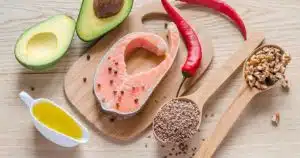One of the most important things you can do for your PCOS is to change the way that you eat, but getting started on a good PCOS diet plan can be tricky. So, in this article, we’ll look at what your PCOS diet should look like and how to go about putting together a PCOS diet plan, with tips and tricks along the way.
Now, before your start putting together your PCOS diet plan, you need to have a rough idea of how you should be eating.
I talk a lot about how to eat and my top PCOS supplements in my free Masterclass, “How to Manage PCOS Naturally.” It will give you so much wonderful information on how to get started on your PCOS Diet.
What is a PCOS Diet?
Well, research has shown that diet and lifestyle changes are more effective than medication in managing PCOS (1). It’s a big bold statement but one that is true.
So, we know that we need to change the way that we eat to improve our PCOS and its symptoms. We need a PCOS diet. But what should we be eating and avoiding?
To fully answer that, we need to understand a fundamental truth about PCOS. Women with PCOS have inherent difficulties in processing carbohydrates and insulin. We tend to produce too much insulin which causes our ovaries to release too much testosterone, leading to a lot of the symptoms of PCOS (2).
So, we have to get our insulin levels under control if we are going to get our PCOS under control.
PCOS and Dairy
Dairy has a protein called IGF-1 that mimics insulin in the body. It’s primary function is to stimulate growth in newborn babies. The problem is that when we have dairy products, the IGF-1 in the dairy causes our ovaries to release testosterone, making our PCOS symptoms worse (3).
So, I recommend avoiding dairy for your PCOS.
PCOS and Gluten
Gluten tends to cause inflammation in our bodies and we already have higher levels of inflammation as a result of our PCOS. This elevated inflammation causes us to be more resistant to insulin.
The more insulin resistant we are, the more insulin we need to manage our blood sugar levels, the more testosterone we’ll produce from our ovaries.
So, giving up gluten-laden foods is a good option for PCOS.
PCOS and Low Glycemic Index foods
Another way that we can help to manage our PCOS and insulin levels is by making sure that we eat foods with a low glycemic load. This means that the foods that we eat will cause a slow, gradual rise in insulin levels, meaning that less testosterone will be produced by the ovaries.
So, how do you know if a food has a low glycemic load? Well, focusing on unprocessed unrefined whole foods is a good way to go. The more processed or refined a food is, the more quickly it is metabolised by the body and the higher the need for insulin will be.
PCOS and Soy
Research has shown that soy tends to cause a delay in ovulation in women who are trying to conceive. Now, you may not be trying to conceive but women with PCOS already have issues around ovulation (4). I would not want to delay ovulation further by consuming soy-based products so I recommend avoiding soy.
So, that sums up what a PCOS diet looks like. The next question is, “Why do I need a PCOS Diet Plan?”
Why do I need a PCOS diet plan?
When you start anything new, whether it be a new job, a new exercise routine or a new way of eating, it is always helpful to have a plan. You see, it’s when we don’t have a plan that things seem to go wrong. Let’s use an analogy here.

All of this planning needs to happen before you even set foot in your new offices on your first day of work. And without this careful planning and consideration, you’re likely to be late or dressed inappropriately and that’s not the kind of first impression you want to make.
So, let’s get back to your PCOS diet plan. Just like with your first day at a new job, there is some planning that needs to done when you start a new way of eating. For example: What can you and can’t you eat (which we’ve already covered but you can find out more about the Best PCOS Diet here)? What will you have for each meal? How do you make sure that you stick with it and not give in to the cravings when they come? Do you have enough food in your pantry and fridge that are compliant or do you need to do a grocery shop first?
All of these things need to be taken into account before you start your PCOS diet plan.
So, here are some tips to get you started:
5 Steps to getting started on your PCOS Diet Plan
1. Know your why
I’m the kind of person who has to know why I’m doing what I’m doing. I really struggle if someone tells me that I need to do something without telling me why. I can feel myself digging in my heels in resistance. If you tell me WHY, though, I’m far more likely to do what I’ve been asked, and not just do it, but do it whole heartedly.
So, in doing all of my research I found some very compelling evidence to explain exactly why we need to change our diets and what our new diet needs to look like. I have shared pieces of this throughout this site but if you would like a really comprehensive look at why diet is so key to managing PCOS and what your diet should look like, why not signup for my free PCOS Starter Kit where I share the most important elements to managing. These are things I wish my Doctor had told me about PCOS. You can do that here.
2. Throw Out or Give Away the Junk Foods
I think it’s really helpful to go through your cupboards, fridge and freezer and work out what shouldn’t be there. If you don’t see it and don’t have it in the house, you are much less likely to crave it and if you do crave it, to get your hands on it.
So, what do I mean by junk? Start with the following foods:
- Crisps
- Chocolates
- Biscuits
- Potatoes
- White rice
- Pasta
- Dairy products (you can read more about that here)
- Frozen ready meals – they’re far too processed and contain too many additives
- Rice cakes (very high GI and taste like cardboard – no thanks!)
- Processed meats
- Sodas (even the diet variety)
3. Stock up on PCOS Friendly Foods

You will find a PCOS Pantry List and PCOS Substitutions List in the PCOS Starter Kit that I was telling you about. These lists will give you a good idea of what you need to stock up on when you do hit the shops.
4. Plan your PCOS Meals
Planning your meals in advance should help you to be more organized when it comes to meal times. You’ll also have all of the ingredients you’ll need to prepare a healthy, nutritious meal that will help you get your PCOS under control.
When planning your meals, keep in mind that you’re looking for recipes that are:
- Dairy free
- Low GI with a low Glycemic Load
- Balanced in terms of carbs and protein
- Free of refined foods and sugars
- Low in saturated fats
Let’s be honest. Sometimes finding the recipes that meet that exact criteria can be tricky. And once we know that a recipe doesn’t have gluten or dairy, how do we even know what it will do to our insulin levels? This is where PCOS Foodies comes in. PCOS Foodies is the most advanced and dynamic meal planning system, designed specifically for women with PCOS. Amazing delicious foods right at your fingertips. Nutrition data for any recipe at the touch of a button. Grocery lists done for you – and you’ll never leave them at home when you head to the shops cause you can just pull them up on a mobile app. It’s pretty darn amazing!
You can check out PCOS Foodies here.
5. Get Support to Stick with It

So, get someone on your team. It could be your partner, your best friend, someone else you know who has PCOS. But doing it together is much easier than doing it on your own.
If you’re struggling to think of someone who you can do this with, the PCOS Diet Support Facebook Page is a good place to find the motivation and support that you need to keep going.
Okay, so just to summarise some of the key points:
- Following a good PCOS diet is crucial to managing your PCOS and it’s symptoms (its even more effective than medication).
- A PCOS diet is gluten free, dairy free, soy free and focuses on foods with a low glycemic load to help you manage your insulin and testosterone levels.
- It’s important to have a PCOS diet plan to help you make the transition to a new way of eating smoother.
- There are 5 steps that will help you get started:
- Know your Why
- Throw out or giveaway the junk food
- Stock up on PCOS friendly foods
- Plan your PCOS meals
- Get Support
What other tips or tricks have you found helpful in getting started with a new way of eating? Let me know and leave me a comment below!
- sustainable pcos weight loss strategies
- Over 5500 women have done it and seen results
- [bonus] combat cravings kit
- [bonus] intermittent fasting for pcos course
- [BONUS] personalised nutrition plan
JOIN OVER 5,500 OTHERS







